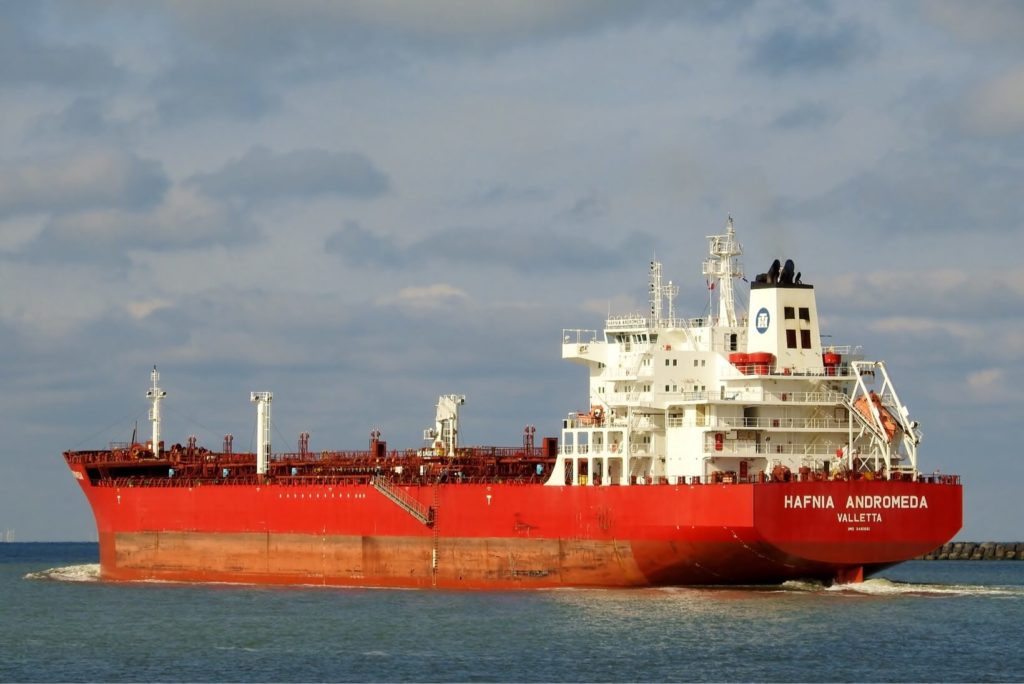Financials
Independent Auditor’s Report
To the Board of Directors and Shareholders of Hafnia Limited
Report on the audit of the consolidated financial statements
Opinion
We have audited the consolidated financial statements of Hafnia Limited (the “Company”) and its subsidiaries (the “Group”), which comprise the consolidated balance sheet of the Group as at 31 December 2019, the consolidated statements of comprehensive income, changes in equity and cash flows for the year then ended, and notes comprising significant accounting policies and other explanatory information.
In our opinion, the accompanying consolidated financial statements present fairly, in all material respects, the consolidated financial position of the Group as at 31 December 2019, and its consolidated financial performance, consolidated changes in equity and consolidated cash flows for the year then ended in accordance with International Financial Reporting Standards (IFRS).
Basis for Opinion
We conducted our audit in accordance with International Standards on Auditing (ISAs). Our responsibilities under those standards are further described in the Auditors’ responsibilities for the audit of the consolidated financial statements section of our report. We are independent of the Group in accordance with the International Ethics Standards Board for Accountants Code of Ethics for Professional Accountants (IESBA Code), the Singapore Accounting and Corporate Regulatory Authority Code of Professional Conduct and Ethics for Public Accountants and Accounting Entities (ACRA Code), together with the ethical requirements that are relevant to our audit of the consolidated financial statements in Singapore, and we have fulfilled our other ethical responsibilities in accordance with these requirements and the IESBA Code and the ACRA Code. We believe that the audit evidence we have obtained is sufficient and appropriate to provide a basis for our opinion.

Key Audit Matter
Key audit matters are those matters that, in our professional judgment, were of most significance in our audit of the financial statements of the current period. These matters were addressed in the context of our audit of the financial statements as a whole, and in forming our opinion thereon, and we do not provide a separate opinion on these matters.
Key audit matter
Impairment assessment of vessels Refer to Note 2.2, 2.4(b) and Note 8 of the Group’s financial statements.
As at 31 December 2019, the carrying value of the Group’s vessels (including dry-docking) amounted to USD 2,182 million.
The Group has identified the relevant cash-generating units for its fleet of vessels according to size, and mode of deployment in the generation of revenues; and performed its vessels impairment test according to its stated policy in Note 2.4(b). Vessels deployed in the 3 commercial pools – LR, MR and Handy constitute the Group’s most significant CGUs.
Under the Group’s vessels impairment assessment exercise conducted as at 31 December 2019, the market valuation of the fleet of vessels provided by the independent shipbrokers was primarily used. Such market valuation can however fluctuate caused by the cyclical nature of freight rates, which makes vessel valuation a judgemental matter. Nevertheless, based on available market transactions supporting such market valuation of vessels received, and together with other internal and external factors, the Group concluded that there are no impairment indicators since the formation of the combined Group on 16 January 2019 following the Group re-organisation of entities. Accordingly, there is no impairment loss or reversal of previously recognised impairment loss recorded for the year ended 31 December 2019..
How the matter was addressed in our audit
We have performed the following audit procedures:
- We assessed the Group’s process for identifying the relevant CGUs for its vessels for impairment testing
- We evaluated the independence, competence and objectivity of the independent brokers engaged to appraise the market valuation of the vessels
- We assessed the valuation methodologies and key assumptions used by the independent brokers in determining the market valuation of the vessels
- We compared the market valuation provided by the independent brokers against recent sale transactions of similar types of vessels
No significant matters were noted from our procedures.
KPMG LLP (Registration No. T08LL1267L), an accounting limited liability partnership registered in Singapore under the Limited Liability Partnership Act (Chapter 163A) and a member firm of the KPMG network of independent member firms affiliated with KPMG International Cooperative (“KPMG International”), a Swiss entity.
Other information
Management is responsible for the other information. The other information comprises all information included in the annual report, but does not include the financial statements and our auditors’ report thereon.
Our opinion on the financial statements does not cover the other information and we do not express any form of assurance conclusion thereon.
In connection with our audit of the consolidated financial statements, our responsibility is to read the other information and, in doing so, consider whether the other information is materially inconsistent with the consolidated financial statements or our knowledge obtained in the audit or otherwise appears to be materially misstated. If, based on the work we have performed, we conclude that there is a material misstatement of this other information, we are required to report that fact. We have nothing to report in this regard.
Responsibilities of management and those charged with governance for the consolidated financial statements
Management is responsible for the preparation and fair presentation of the consolidated financial statements in accordance with IFRS, and for such internal control as management determines is necessary to enable the preparation of the consolidated financial statements that are free from material misstatement, whether due to fraud or error.
In preparing the consolidated financial statements, management is responsible for assessing the Group’s ability to continue as a going concern, disclosing, as applicable, matters related to going concern and using the going concern basis of accounting unless management either intends to liquidate the Group or to cease operations, or has no realistic alternative but to do so.
Those charged with governance are responsible for overseeing the Group’s financial reporting process.
Auditors’ responsibilities for the audit of the consolidated financial statements
Our objectives are to obtain reasonable assurance about whether the consolidated financial statements as a whole are free from material misstatement, whether due to fraud or error, and to issue an auditors’ report that includes our opinion. Reasonable assurance is a high level of assurance, but is not a guarantee that an audit conducted in accordance with ISAs will always detect a material misstatement when it exists. Misstatements can arise from fraud or error and are considered material if, individually or in the aggregate, they could reasonably be expected to influence the economic decisions of users taken on the basis of these consolidated financial statements.
As part of an audit in accordance with ISAs, we exercise professional judgement and maintain professional scepticism throughout the audit. We also:
- Identify and assess the risks of material misstatement of the consolidated financial statements, whether due to fraud or error, design and perform audit procedures responsive to those risks, and obtain audit evidence that is sufficient and appropriate to provide a basis for our opinion. The risk of not detecting a material misstatement resulting from fraud is higher than for one resulting from error, as fraud may involve collusion, forgery, intentional omissions, misrepresentations, or the override of internal control.
- Obtain an understanding of internal controls relevant to the audit in order to design audit procedures that are appropriate in the circumstances, but not for the pur-pose of expressing an opinion on the effectiveness of the Group’s internal controls.
- Evaluate the appropriateness of accounting policies used and the reasonableness of accounting estimates and related disclosures made by management.
- Conclude on the appropriateness of management’s use of the going concern basis of accounting and, based on the audit evidence obtained, whether a material un-certainty exists related to events or conditions that may cast significant doubt on the Group’s ability to continue as a going concern. If we conclude that a material uncertainty exists, we are required to draw attention in our auditors’ report to the related disclosures in the financial statements or, if such disclosures are in-adequate, to modify our opinion. Our conclusions are based on the audit evidence obtained up to the date of our auditors’ report. However, future events or conditions may cause the Group to cease to continue as a going concern.
- Evaluate the overall presentation, structure and content of the consolidated financial statements, including the disclosures, and whether the consolidated financial statements represent the underlying transactions and events in a manner that achieves fair presentation.
- Obtain sufficient appropriate audit evidence regarding the financial information of the entities or business activities within the Group to express an opinion on the consolidated financial statements. We are responsible for the direction, supervision and performance of the group audit. We remain solely responsible for our audit opinion.
We communicate with those charged with governance regarding, among other matters, the planned scope and timing of the audit and significant audit findings, including any significant deficiencies in internal controls that we identify during our audit.
We also provide those charged with governance with a statement that we have com-plied with relevant ethical requirements regarding independence, and communicate with them all relationships and other matters that may reasonably be thought to bear on our independence, and where applicable, related safeguards.
From the matters communicated with those charged with governance, we determine those matters that were of most significance in the audit of the consolidated financial statements of the current period and are therefore the key audit matters. We describe these matters in our auditors’ report unless law or regulation precludes public disclo-sure about the matter or when, in extremely rare circumstances, we determine that a matter should not be communicated in our report because the adverse consequences of doing so would reasonably be expected to outweigh the public interest benefits of such communication.
The engagement partner on the audit resulting in this independent auditors’ report is Kenny Tan Choon Wah.
KPMG LLP
Public Accountants and
Chartered Accountants
Singapore
24 February 2020
